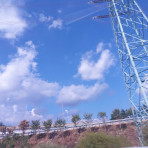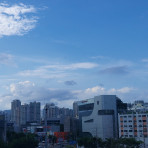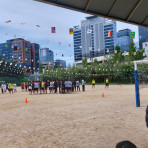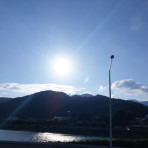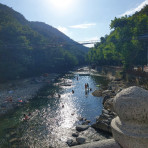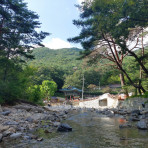Philippines launches patrols around disputed shoal to protect fishing …
본문
Fri, 16 Feb 2024 14:44:12 -0500

The Philippines this month launched coast guard patrols around Scarborough Shoal to safeguard its exclusive economic zone and challenge China, which for 12 years has dominated those waters vital to the Filipino fishing industry, the national security adviser said Friday.
Eduardo Año said the regular patrols, which began in early February, were in line with President Ferdinand Marcos Jr.’s goal of achieving food security and making it safe for local fishermen to access prime fishing grounds.
The triangle-shaped shoal became the focus of a landmark international court case over disputed waters in the South China Sea after Beijing took control of Scarborough Shoal in 2012.
“The Philippine government has taken decisive action to protect the rights and safety of Filipino fishermen in the waters of Bajo De Masinloc,” Año said in a statement, using the local name for the shoal.
“The national government has directed the Philippine Coast Guard (PCG) and Bureau of Fisheries and Aquatic Resources (BFAR) to deploy their vessels for rotational deployment in BDM starting this month,” the security adviser said.
Scarborough Shoal, a resource-rich rock claimed by the Philippines, China and Taiwan, lies about 120 nautical miles west of Zambales, a coastal province in the main Philippine island of Luzon.
It has served as a traditional fishing ground and a natural shelter for Filipino fishermen against harsh weather at sea, and is considered a vital link to food security for many coastal communities in the Philippines.
“These efforts aim to ensure the safety and security of our Filipino fishermen in their traditional fishing grounds. Further, both PCG and BFAR were directed to distribute food packs, groceries and even fuel to support the fishermen in sustaining their activities,” Año said.
Scarborough Shoal (also known as Bajo de Masinloc, Panatag Shoal and Huangyan Dao) is seen in a satellite photo, Nov. 18, 2015. (CSIS/AMTI – Digital Globe)
The announcement came amid China’s intensified aggressiveness in the waters in and around the shoal, which has effectively remained under Beijing’s control since a tense standoff with Manila in 2012. China has kept a permanent presence there with two coast guard ships guarding the mouth of the shoal.
Patrols launched
From Feb. 1 to 9, the BRP Teresa Magbanua, a Philippine Coast Guard ship, patrolled around the shoal but was harassed and blocked by China Coast Guard and maritime militia ships, according to PCG spokesman Jay Tarriela.
On Feb. 11, Tarriela said four Chinese ships shadowed the Philippine ship on more than 40 occasions. The official added that the Chinese ships performed dangerous maneuvers, even crossing the bow of the Philippine ship twice.
Gan Yu, a China Coast Guard spokesman, responded by accusing the Philippine ship of “intruding” into Chinese waters.
“When the warnings issued by the Chinese Coast Guard were ineffective, the Chinese Coast Guard adopted route control and forced evacuation measures against the Philippine ship in accordance with the law and the on-site handling was professional and standardized,” Gan said.
Año responded, saying “there is no truth” to the Chinese claim.
Philippine National Security Adviser Eduardo Año (center) answers questions from reporters on Thitu Island in the disputed South China Sea during the unveiling of a Philippine Coast Guard monitoring station, Dec. 1, 2023. (Jam Sta Rosa/AFP)
In December 2023, Chinese ships fired water cannon against three BFAR ships, damaging equipment on the Philippine ships.
Prior to that, China installed a 300-meter floating barrier at the southeast part of the shoal to block Philippine ships.
The National Security Council, Año said, “reaffirms the Philippines’ sovereign rights and jurisdiction over Bajo de Masinloc and its surrounding waters,” saying these are recognized under international law, including the United Nations Convention on the Law of the Sea (UNCLOS).
In 2016, an international tribunal in The Hague ruled in favor of Manila, which had filed an arbitration case, and against Beijing’s sweeping maritime claims in the South China Sea.
In the landmark ruling, the Permanent Court of Arbitration said the shoal was a traditional fishing ground for many fishermen of different nationalities, including Filipino and Chinese, and that Chinese actions there were illegal.
BenarNews is an RFA-affiliated news service.
The Philippines this month launched coast guard patrols around Scarborough Shoal to safeguard its exclusive economic zone and challenge China, which for 12 years has dominated those waters vital to the Filipino fishing industry, the national security adviser said Friday.
Eduardo Año said the regular patrols, which began in early February, were in line with President Ferdinand Marcos Jr.’s goal of achieving food security and making it safe for local fishermen to access prime fishing grounds.
The triangle-shaped shoal became the focus of a landmark international court case over disputed waters in the South China Sea after Beijing took control of Scarborough Shoal in 2012.
“The Philippine government has taken decisive action to protect the rights and safety of Filipino fishermen in the waters of Bajo De Masinloc,” Año said in a statement, using the local name for the shoal.
“The national government has directed the Philippine Coast Guard (PCG) and Bureau of Fisheries and Aquatic Resources (BFAR) to deploy their vessels for rotational deployment in BDM starting this month,” the security adviser said.
Scarborough Shoal, a resource-rich rock claimed by the Philippines, China and Taiwan, lies about 120 nautical miles west of Zambales, a coastal province in the main Philippine island of Luzon.
It has served as a traditional fishing ground and a natural shelter for Filipino fishermen against harsh weather at sea, and is considered a vital link to food security for many coastal communities in the Philippines.
“These efforts aim to ensure the safety and security of our Filipino fishermen in their traditional fishing grounds. Further, both PCG and BFAR were directed to distribute food packs, groceries and even fuel to support the fishermen in sustaining their activities,” Año said.
Scarborough Shoal (also known as Bajo de Masinloc, Panatag Shoal and Huangyan Dao) is seen in a satellite photo, Nov. 18, 2015. (CSIS/AMTI – Digital Globe)
The announcement came amid China’s intensified aggressiveness in the waters in and around the shoal, which has effectively remained under Beijing’s control since a tense standoff with Manila in 2012. China has kept a permanent presence there with two coast guard ships guarding the mouth of the shoal.
Patrols launched
From Feb. 1 to 9, the BRP Teresa Magbanua, a Philippine Coast Guard ship, patrolled around the shoal but was harassed and blocked by China Coast Guard and maritime militia ships, according to PCG spokesman Jay Tarriela.
On Feb. 11, Tarriela said four Chinese ships shadowed the Philippine ship on more than 40 occasions. The official added that the Chinese ships performed dangerous maneuvers, even crossing the bow of the Philippine ship twice.
Gan Yu, a China Coast Guard spokesman, responded by accusing the Philippine ship of “intruding” into Chinese waters.
“When the warnings issued by the Chinese Coast Guard were ineffective, the Chinese Coast Guard adopted route control and forced evacuation measures against the Philippine ship in accordance with the law and the on-site handling was professional and standardized,” Gan said.
Año responded, saying “there is no truth” to the Chinese claim.
Philippine National Security Adviser Eduardo Año (center) answers questions from reporters on Thitu Island in the disputed South China Sea during the unveiling of a Philippine Coast Guard monitoring station, Dec. 1, 2023. (Jam Sta Rosa/AFP)
In December 2023, Chinese ships fired water cannon against three BFAR ships, damaging equipment on the Philippine ships.
Prior to that, China installed a 300-meter floating barrier at the southeast part of the shoal to block Philippine ships.
The National Security Council, Año said, “reaffirms the Philippines’ sovereign rights and jurisdiction over Bajo de Masinloc and its surrounding waters,” saying these are recognized under international law, including the United Nations Convention on the Law of the Sea (UNCLOS).
In 2016, an international tribunal in The Hague ruled in favor of Manila, which had filed an arbitration case, and against Beijing’s sweeping maritime claims in the South China Sea.
In the landmark ruling, the Permanent Court of Arbitration said the shoal was a traditional fishing ground for many fishermen of different nationalities, including Filipino and Chinese, and that Chinese actions there were illegal.
BenarNews is an RFA-affiliated news service.
자유아시아방송 제공 및 저작권 소유 | RFA provided and copyrighted -www.rfa.org

The Philippines this month launched coast guard patrols around Scarborough Shoal to safeguard its exclusive economic zone and challenge China, which for 12 years has dominated those waters vital to the Filipino fishing industry, the national security adviser said Friday.
Eduardo Año said the regular patrols, which began in early February, were in line with President Ferdinand Marcos Jr.’s goal of achieving food security and making it safe for local fishermen to access prime fishing grounds.
The triangle-shaped shoal became the focus of a landmark international court case over disputed waters in the South China Sea after Beijing took control of Scarborough Shoal in 2012.
“The Philippine government has taken decisive action to protect the rights and safety of Filipino fishermen in the waters of Bajo De Masinloc,” Año said in a statement, using the local name for the shoal.
“The national government has directed the Philippine Coast Guard (PCG) and Bureau of Fisheries and Aquatic Resources (BFAR) to deploy their vessels for rotational deployment in BDM starting this month,” the security adviser said.
Scarborough Shoal, a resource-rich rock claimed by the Philippines, China and Taiwan, lies about 120 nautical miles west of Zambales, a coastal province in the main Philippine island of Luzon.
It has served as a traditional fishing ground and a natural shelter for Filipino fishermen against harsh weather at sea, and is considered a vital link to food security for many coastal communities in the Philippines.
“These efforts aim to ensure the safety and security of our Filipino fishermen in their traditional fishing grounds. Further, both PCG and BFAR were directed to distribute food packs, groceries and even fuel to support the fishermen in sustaining their activities,” Año said.
Scarborough Shoal (also known as Bajo de Masinloc, Panatag Shoal and Huangyan Dao) is seen in a satellite photo, Nov. 18, 2015. (CSIS/AMTI – Digital Globe)
The announcement came amid China’s intensified aggressiveness in the waters in and around the shoal, which has effectively remained under Beijing’s control since a tense standoff with Manila in 2012. China has kept a permanent presence there with two coast guard ships guarding the mouth of the shoal.
Patrols launched
From Feb. 1 to 9, the BRP Teresa Magbanua, a Philippine Coast Guard ship, patrolled around the shoal but was harassed and blocked by China Coast Guard and maritime militia ships, according to PCG spokesman Jay Tarriela.
On Feb. 11, Tarriela said four Chinese ships shadowed the Philippine ship on more than 40 occasions. The official added that the Chinese ships performed dangerous maneuvers, even crossing the bow of the Philippine ship twice.
Gan Yu, a China Coast Guard spokesman, responded by accusing the Philippine ship of “intruding” into Chinese waters.
“When the warnings issued by the Chinese Coast Guard were ineffective, the Chinese Coast Guard adopted route control and forced evacuation measures against the Philippine ship in accordance with the law and the on-site handling was professional and standardized,” Gan said.
Año responded, saying “there is no truth” to the Chinese claim.
Philippine National Security Adviser Eduardo Año (center) answers questions from reporters on Thitu Island in the disputed South China Sea during the unveiling of a Philippine Coast Guard monitoring station, Dec. 1, 2023. (Jam Sta Rosa/AFP)
In December 2023, Chinese ships fired water cannon against three BFAR ships, damaging equipment on the Philippine ships.
Prior to that, China installed a 300-meter floating barrier at the southeast part of the shoal to block Philippine ships.
The National Security Council, Año said, “reaffirms the Philippines’ sovereign rights and jurisdiction over Bajo de Masinloc and its surrounding waters,” saying these are recognized under international law, including the United Nations Convention on the Law of the Sea (UNCLOS).
In 2016, an international tribunal in The Hague ruled in favor of Manila, which had filed an arbitration case, and against Beijing’s sweeping maritime claims in the South China Sea.
In the landmark ruling, the Permanent Court of Arbitration said the shoal was a traditional fishing ground for many fishermen of different nationalities, including Filipino and Chinese, and that Chinese actions there were illegal.
BenarNews is an RFA-affiliated news service.
The Philippines this month launched coast guard patrols around Scarborough Shoal to safeguard its exclusive economic zone and challenge China, which for 12 years has dominated those waters vital to the Filipino fishing industry, the national security adviser said Friday.
Eduardo Año said the regular patrols, which began in early February, were in line with President Ferdinand Marcos Jr.’s goal of achieving food security and making it safe for local fishermen to access prime fishing grounds.
The triangle-shaped shoal became the focus of a landmark international court case over disputed waters in the South China Sea after Beijing took control of Scarborough Shoal in 2012.
“The Philippine government has taken decisive action to protect the rights and safety of Filipino fishermen in the waters of Bajo De Masinloc,” Año said in a statement, using the local name for the shoal.
“The national government has directed the Philippine Coast Guard (PCG) and Bureau of Fisheries and Aquatic Resources (BFAR) to deploy their vessels for rotational deployment in BDM starting this month,” the security adviser said.
Scarborough Shoal, a resource-rich rock claimed by the Philippines, China and Taiwan, lies about 120 nautical miles west of Zambales, a coastal province in the main Philippine island of Luzon.
It has served as a traditional fishing ground and a natural shelter for Filipino fishermen against harsh weather at sea, and is considered a vital link to food security for many coastal communities in the Philippines.
“These efforts aim to ensure the safety and security of our Filipino fishermen in their traditional fishing grounds. Further, both PCG and BFAR were directed to distribute food packs, groceries and even fuel to support the fishermen in sustaining their activities,” Año said.
Scarborough Shoal (also known as Bajo de Masinloc, Panatag Shoal and Huangyan Dao) is seen in a satellite photo, Nov. 18, 2015. (CSIS/AMTI – Digital Globe)
The announcement came amid China’s intensified aggressiveness in the waters in and around the shoal, which has effectively remained under Beijing’s control since a tense standoff with Manila in 2012. China has kept a permanent presence there with two coast guard ships guarding the mouth of the shoal.
Patrols launched
From Feb. 1 to 9, the BRP Teresa Magbanua, a Philippine Coast Guard ship, patrolled around the shoal but was harassed and blocked by China Coast Guard and maritime militia ships, according to PCG spokesman Jay Tarriela.
On Feb. 11, Tarriela said four Chinese ships shadowed the Philippine ship on more than 40 occasions. The official added that the Chinese ships performed dangerous maneuvers, even crossing the bow of the Philippine ship twice.
Gan Yu, a China Coast Guard spokesman, responded by accusing the Philippine ship of “intruding” into Chinese waters.
“When the warnings issued by the Chinese Coast Guard were ineffective, the Chinese Coast Guard adopted route control and forced evacuation measures against the Philippine ship in accordance with the law and the on-site handling was professional and standardized,” Gan said.
Año responded, saying “there is no truth” to the Chinese claim.
Philippine National Security Adviser Eduardo Año (center) answers questions from reporters on Thitu Island in the disputed South China Sea during the unveiling of a Philippine Coast Guard monitoring station, Dec. 1, 2023. (Jam Sta Rosa/AFP)
In December 2023, Chinese ships fired water cannon against three BFAR ships, damaging equipment on the Philippine ships.
Prior to that, China installed a 300-meter floating barrier at the southeast part of the shoal to block Philippine ships.
The National Security Council, Año said, “reaffirms the Philippines’ sovereign rights and jurisdiction over Bajo de Masinloc and its surrounding waters,” saying these are recognized under international law, including the United Nations Convention on the Law of the Sea (UNCLOS).
In 2016, an international tribunal in The Hague ruled in favor of Manila, which had filed an arbitration case, and against Beijing’s sweeping maritime claims in the South China Sea.
In the landmark ruling, the Permanent Court of Arbitration said the shoal was a traditional fishing ground for many fishermen of different nationalities, including Filipino and Chinese, and that Chinese actions there were illegal.
BenarNews is an RFA-affiliated news service.
좋아요3
이 글을 좋아요하셨습니다
관련링크
등록된 댓글이 없습니다.






